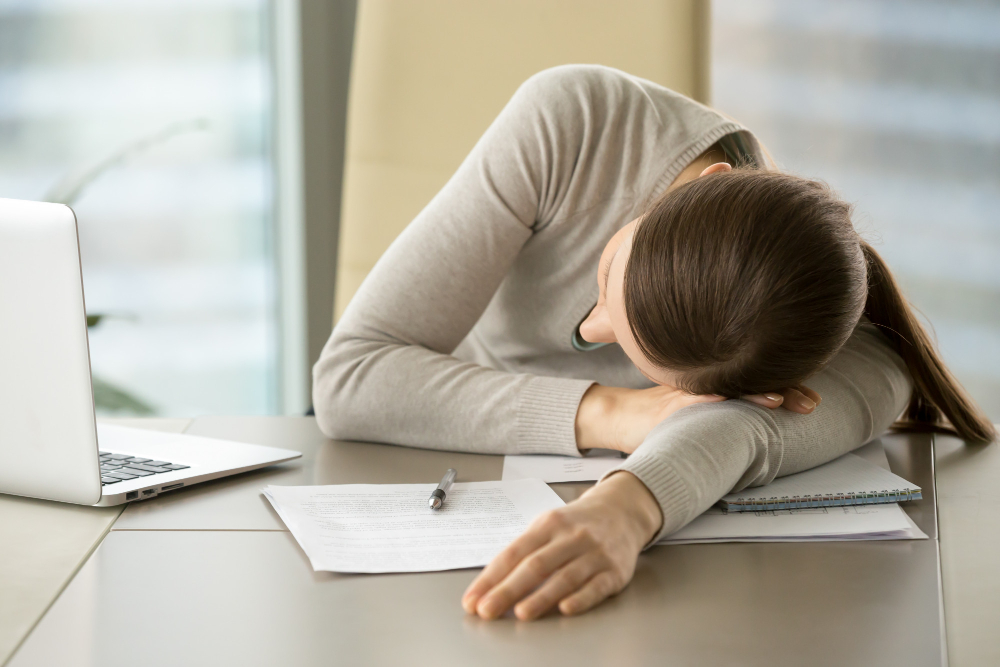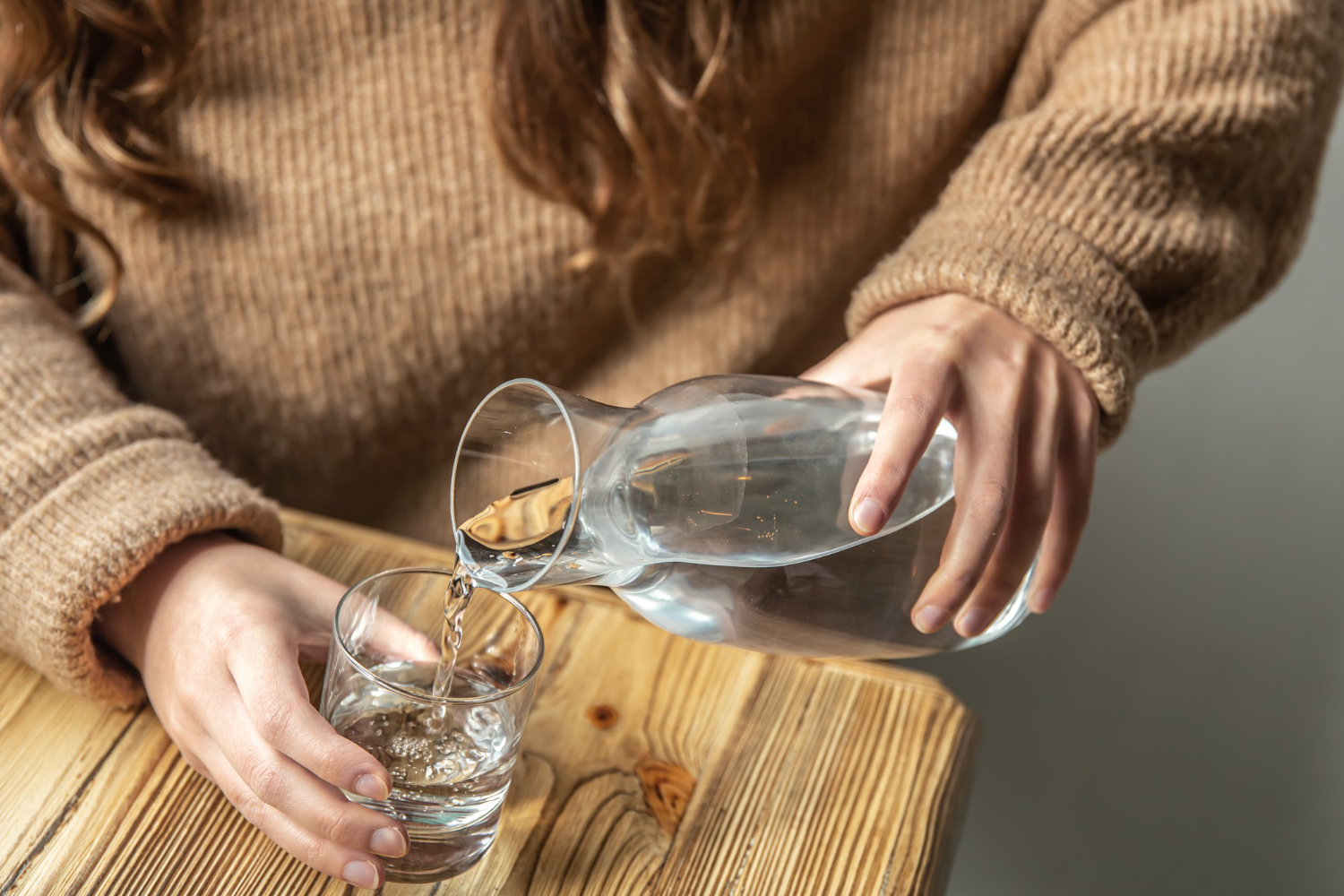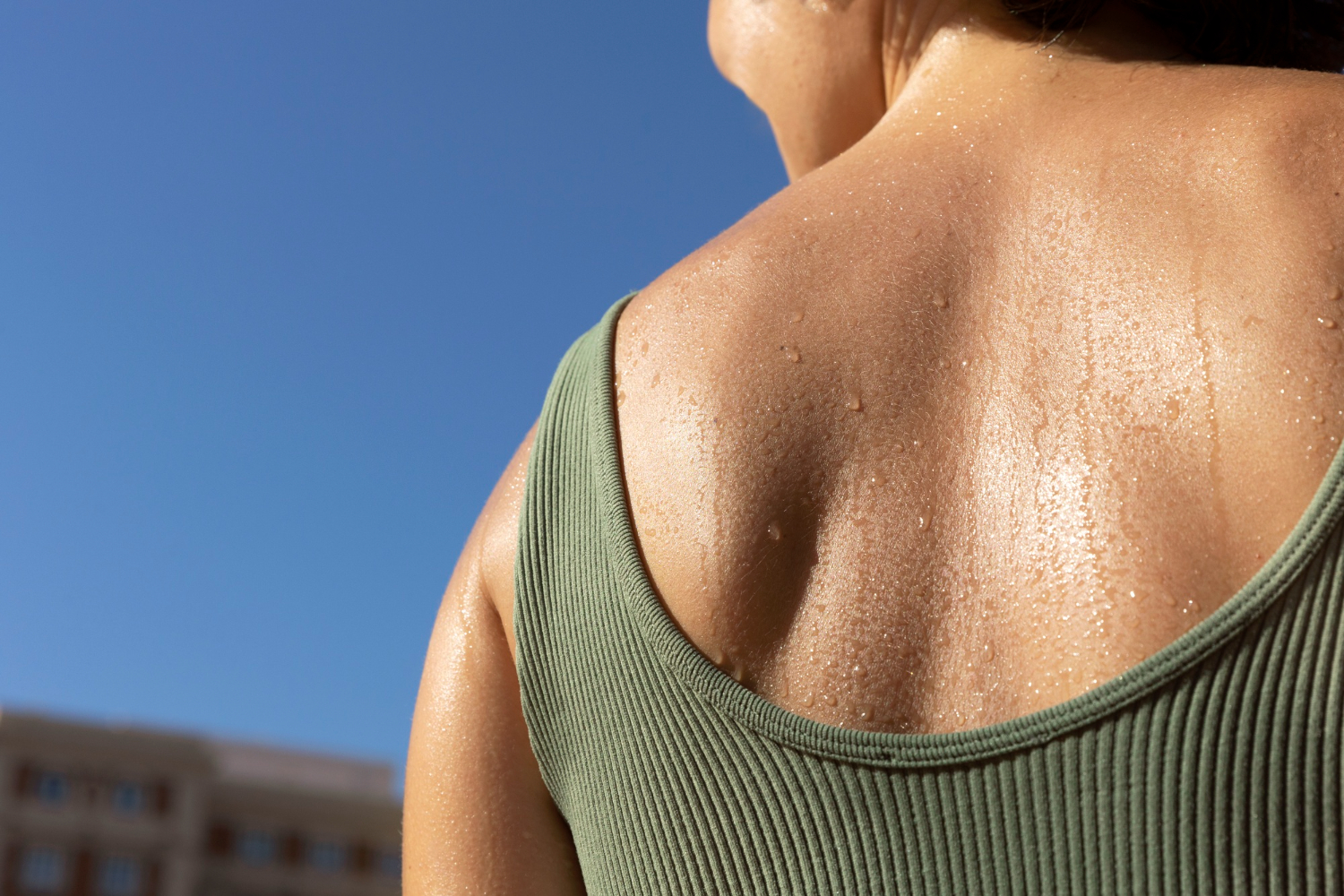What is Dehydration?
Dehydration is a physiological state that arises when the body experiences a deficit in fluids due to an inadequate water intake. This discrepancy disturbs vital functions of the body, as water plays a critical role in several bodily processes like temperature control, digestion, and nutrient transport.
Dehydration can arise from various reasons such as inadequate fluid consumption, excessive perspiration, emesis, diarrhea and certain conditions. It's essential to recognize the signs of dehydration, such as dry mouth, dark urine, and fatigue, to take proactive steps towards maintaining proper hydration. It is essential to identify symptoms of dehydration for maintaining general health and wellness.

What are the Symptoms of Dehydration?
Common symptoms of dehydration include dry mouth, dark urine, fatigue, and dizziness, serving as vital indicators of the body's fluid imbalance. It is crucial to detect the indications of dehydration promptly to avoid the potential adverse consequences. The initial symptoms may consist of a parched mouth, urine that is dark yellow in color, and a sensation of thirst.
As dehydration advances, people may feel exhausted, unsteady, or dizzy. They might also experience muscle cramps, headaches, and an increased heart rate. In more severe situations, dehydration can cause sunken eyes, dry skin, disorientation, and even fainting. Identifying these warning signs empowers individuals to take proactive measures to rehydrate and restore their body's balance.
What are the Levels of Dehydration?
Dehydration exists on a continuum, with mild and severe states characterized by various degrees of fluid loss and corresponding effects on bodily functions. In mild dehydration, one may experience slight discomfort such as dry mouth and increased thirst.
As dehydration progresses to a moderate stage, symptoms become more pronounced, including fatigue, darker urine, and muscle cramps. Severe dehydration is the most critical phase and can lead to hazardous complications like rapid heartbeat, low blood pressure, and confusion. Recognizing these levels of dehydration is crucial in determining the urgency of intervention required.
What Causes Dehydration?
Engaging in physical activities such as exercise or spending time in hot weather can cause the body to lose water through sweat, underscoring the need for increased fluid intake. Dehydration may result from various factors, all of which contribute to an imbalance between fluid intake and loss. One of the primary reasons is inadequate fluid intake due to insufficient consumption of water or other hydrating beverages.
Environmental conditions such as hot weather can also lead to increased sweating, resulting in significant fluid loss. Additionally, gastrointestinal problems like diarrhea and vomiting expel fluids and electrolytes rapidly. Medical conditions such as diabetes and kidney disease can disrupt water regulation within the body. Furthermore, excessive alcohol consumption and certain medications can also cause dehydration.
What are the Risks of Dehydration?
Dehydration has the ability to cause a variety of complications, ranging from minor discomforts to grave health concerns. Among the immediate consequences are indications such as exhaustion, lightheadedness, and muscle cramps, which can disturb daily activities. Long-term or severe dehydration can negatively impact crucial organs and functions causing issues like urinary tract infections, kidney problems, and electrolyte imbalances.
In athletes, inadequate hydration not only impairs performance but also heightens their chances of heat-related health problems. Furthermore, certain vulnerable populations like young children and elderly individuals face even greater risks because they have limited capacity for regulating body temperature and fluid balance. Proper hydration becomes even more critical for older adults, as they may have a decreased sensation of thirst and are at a higher risk of dehydration due to age-related changes.

How is Dehydration Determined?
The identification of dehydration involves a combination of various factors, such as recognizing symptoms, assessing medical history, and utilizing certain other methods. Healthcare professionals usually take visible signs like dry mouth, sunken eyes, and changes in skin elasticity into account.
They may also ask questions about fluid intake patterns, recent illnesses or events leading up to the dehydration, and factors such as excessive sweating or diarrhea. In order to confirm the levels of dehydration, lab tests are carried out which play a pivotal role in providing accurate information.
Blood tests can reveal electrolyte imbalances while urine tests assess the concentration. For more severe cases additional testing might be required to evaluate kidney function.
What is the Fastest Way to Rehydrate?
It is of utmost importance to promptly tackle dehydration, and the swiftest method for rehydration depends on the degree of severity. For mild cases of dehydration, one can often suffice by augmenting fluid consumption through sipping water, or oral rehydration solutions. Additionally, consuming fruits and vegetables that have high water content such as watermelon and cucumber can help with hydration.
In instances where dehydration is moderate in nature, it may be beneficial to incorporate beverages that are rich in electrolytes or sports drinks for replenishing lost minerals. If dehydration becomes severe, medical professionals may need to administer intravenous fluids.
Can Dehydration be Prevented?
Preventing dehydration is achievable by staying proactive about drinking fluids throughout the day and being attentive to your body's hydration needs. Prevention of dehydration can be achieved through a combination of conscientious practices and proactive measures. It is vital to regularly consume water throughout the day, regardless of thirst, to ensure optimal hydration levels are maintained.
In circumstances where the weather is hot or physical activity is intense, increasing fluid intake becomes even more crucial. Including foods and beverages that contain electrolytes can effectively assist in regulating the body's fluid balance.
Monitoring urine color can provide a straightforward method for noticing dehydration – pale yellow indicates adequate hydration while darker yellow indicates insufficient fluids. Furthermore, it is essential to understand individual susceptibility to dehydration, such as during illness or while taking specific medications, in order to develop targeted preventative measures.
How Much Water Do I Need to Drink Daily?
The determination of an appropriate daily water intake amount depends on multiple factors, such as age, activity level, climate, and individual health requirements. As a general guideline for hydration, the '8x8' rule proposes the consumption of eight 8-ounce glasses of water each day equivalent to roughly half a gallon or 2 liters. Nonetheless, this measure is not universally applicable.
Some scholars advocate paying attention to your body's indications of thirst and endeavoring to drink enough water to maintain pale yellow urine. In addition, foods and alternative beverages that contain water contribute to overall hydration levels. In addition to water, other hydrating options like fruit juice and herbal teas contribute to maintaining optimal hydration levels.

How Much Water Should You Drink if You are Dehydrated?
The volume of water consumption to address dehydration is contingent on the extent of its severity. For minor dehydration, it is advisable to slowly sip water and other liquids that help in hydration throughout the day.
In instances where dehydration is moderate, incorporating fluids containing electrolytes like sports drinks or oral rehydration solutions can effectively restore the electrolyte balance in our body.
In situations where dehydration is severe, seeking prompt medical attention becomes imperative as intravenous fluids may be required for rapid and efficient rehydration. It's crucial to exercise caution during rehydration as excessive consumption of water without electrolytes could result in an imbalance within our system.
How Long Does it Take to Rehydrate?
The duration required for rehydration is highly dependent on different factors like the degree of dehydration, personal metabolic rate, and the selected rehydration techniques. Typically, mild dehydration can be resolved within a few hours by gradual consumption of water and other hydrating fluids.
In contrast, moderate dehydration necessitates consistent rehydration efforts lasting up to a day or more, with electrolyte-infused beverages playing a key role in promoting balanced recovery. Severe dehydration demands extended attention and medical intervention if necessary. Therefore, it's crucial to adopt a well-paced approach towards rehydration that avoids overwhelming the body with excessive fluids lacking electrolytes.
How Can You Tell If You're Dehydrated?
Now, the only question that remains is this: just how, exactly, do you go about doing a dehydration test? A few symptoms can show up, read more below:
1. Bad breath
Cup your palm over your mouth and breathe out. How does your breath smell? If you dry-retched a little, well, you're likely dehydrated. To understand why, you should first know that saliva has bacteria-fighting properties. So, imagine what happens when you become dehydrated. Your saliva levels go down. Meaning? Your mouth's ability to fend off odor-causing germs may not be as efficient – explaining the resulting stink.
2. Low energy or fatigue
When you’re dehydrated, your body tries to pull fluid to more centrally located (i.e., more “life-crucial”) organs – like your heart and brain – by contracting your blood vessels. This cuts down on the blood supply that the rest of your body gets. And since blood is a carrier of oxygen and various nutrients (e.g., amino acids and glucose) necessary for normal bodily functions, like metabolism, you’ll feel sluggish and tired.

3. Headaches
The exact reason why dehydration causes headaches isn't known. That said, a prevailing theory is that dehydration could cause a slight, temporary brain contraction by "leaching" fluids from the cerebrospinal fluid (CBF), a watery fluid that surrounds it. This contraction may feel like someone is "squeezing" your brain – which, imaginably, can't be a great feeling.
4. Muscle cramps
Here’s the thing about dehydration. You aren’t simply losing more fluids than are being replaced – but also electrolytes. These are positively charged minerals (e.g., sodium, potassium and magnesium) that play a role in normal muscle contraction and relaxation. So, when you’re dehydrated, you may experience muscle cramps.
This dehydration symptom is particularly common post-exercise, especially if you’re a “salty sweater” (i.e., someone who tends to lose a lot of sodium through sweat).
5. Skin turgor test
As mentioned earlier, when you're dehydrated, your body will shuttle fluids to all life-crucial organs – in turn, drawing water away from the "surface" of your skin. Thus, dehydration is often associated with shriveled and dry skin (i.e., skin lacking elasticity). But wait. How do you measure your skin's elasticity? Well, one quick and easy way is something called the "skin turgor test".
Use two fingers to grab the skin on the back of your hand, pull it up, then let it go. Observe how long it takes to snap back into place. If it’s almost immediate, you’re well-hydrated. But if it stays tented or resumes its shape slowly (say, more than a second), you’re probably dehydrated.
6. Dark and/or foul-smelling urine
Looking at – and smelling – your urine is one of the easiest ways to tell if you’re dehydrated. If your body is low on fluids, it’ll try to conserve whatever it has by releasing as little water as possible into your urine. For this reason, your urine’s concentration of waste products (e.g., sodium and urea) will increase; you also won’t pee very much. So, your urine will not only be darker in color but will also smell a little "off". That said, you shouldn't aim for completely clear urine – this can be a sign of overhydration. Instead, when you're well-hydrated, your urine should be a pale yellow and have little to no odor. Anything else, and it's a sign of dehydration.
7. Urine specific gravity strips
Admittedly, performing a “dehydration in urine” test simply based on the color and smell of your urine can be a tricky affair. That's where at-home urine test strips come in. A urine hydration test strip (also known as urinalysis dehydration test) gives you an objective measure of your hydration status by measuring your urine specific gravity value (i.e., the density of urine to that of water).
In other words: when you’re wondering, “Am I dehydrated?”, using a urine test strip is the most reliable method you could use to determine your hydration levels.

When is the Best Time to Drink Water?
The human body can survive for weeks without food but can only survive for a few days without water. 55-70% of your body is made up of water, which constitutes a significant portion of your body weight. Water is the foundation of your blood, urine, digestive juices, and sweat and is found in muscle mass, fat, and bones.
The water in your body needs to be replenished every day to compensate for the water you lose through your bowel movements, lungs, skin, and urine. The amount of water you need depends on your body size, metabolism, diet, activity level, and the climate in which you live.
Water is vital for healthy living and for your body to function properly. Almost every major system in your body depends on water to function and stay alive. For example, water is important for:
- Controlling your body temperature
- Carrying nutrients and oxygen to the cells
- Lubricating your joints
- Reducing the workload on your kidneys and liver by removing waste products
- Dissolving minerals and nutrients to make them accessible to the body.
While it's clear that drinking enough water is vital for your wellness, you may be wondering if the time of day that you drink water is a factor. Here are some tips on when it’s important during the day to drink water.
After waking up
Drinking a glass of water after you wake up in the morning helps support your internal organs. The water flushes out toxins from the body before you have your first meal of the day. Drinking water after waking up can also improve the health of your skin and hair.
Before your meals
Drinking a glass of water just before a meal is a strategy for losing weight. This not only helps you feel fuller but also helps prevent you from overeating and thus reduces your caloric intake. A glass of water an hour before a meal also helps with digestion. One study looked at obese older adult people who drank 500 mL (16.9 ozs.) of water about 30 minutes before their meals and found that those who drank water ultimately had fewer calories compared to those who didn’t drink water.
Before and after exercise
Water controls your body temperature as well as lubricates your joints. It helps in transporting nutrients to give you energy and keep you healthy. When you're dehydrated, your body can't perform at its best, as it causes muscle fatigue, loss of coordination, and electrolyte imbalance. Without enough water, the body lacks energy, and the muscles can contract involuntarily. Before working out, fill your bottle with 16-20 ounces of water. While you’re exercising, drink 6-12 ounces about every 10-15 minutes. Ensure that you hydrate well after finishing your workout to replace the water you lost while exercising.
When you have a headache
A migraine headache can occur from being dehydrated because there is not enough oxygen reaching the brain when you’re dehydrated. One study tested how water can relieve headaches and found that 47% of people in a group who were instructed to drink water when they had headaches experienced improvement. Try drinking water to see if it helps your headache before taking pain relievers. You may be surprised to find that drinking water keeps the headaches away and energizes you throughout the day.
Before your period
You can relieve premenstrual discomfort and reduce bloating by drinking 8-10 glasses of water before and during your period. Being hydrated helps keep the menstrual blood from coagulating. Dehydration can also be one of the main causes of cramps or headaches during your period.
When you are sick
When you're sick, you inevitably lose more fluids because of sweat, vomit, or diarrhea. Also, the medications you take to dry out and cleanse your system can sometimes make you dehydrated. Also, your metabolism can speed up if you are ill, which means that your body needs more fluids to compensate for increased activity by drinking water or having an electrolyte drink.
Staying hydrated enables your body to circulate blood more freely, allowing cold- and flu-fighting white blood cells to fight viruses better. Drink plenty of water at the first sign of illness, especially if you don't feel like eating. Avoid alcohol and caffeinated beverages because they will dehydrate you more. During illness, it's crucial to prioritize rest and consume plenty of fluids to aid in the recovery process and prevent dehydration.
What Are Dehydration Headaches?
Dehydration headaches are a type of headache that occurs when the body is dehydrated and does not have enough fluids to function properly. Dehydration can cause the blood volume to drop, leading to reduced blood flow to the brain and a decrease in oxygen and nutrients. This can cause the brain to shrink slightly, pulling on the membranes and causing a headache.

What Causes Dehydration Headaches?
Dehydration is the most common cause of dehydration headaches. Dehydration can occur when the body does not have enough fluids to replace those lost through sweat, urine, and other means. Dehydration can be caused by a variety of factors, including:
- Not drinking enough fluids: This is the most common cause of dehydration. The body needs a certain amount of fluids each day to function properly, and not getting enough fluids can cause dehydration.
- Excessive sweating: Sweating is the body's way of regulating its temperature, but excessive sweating can cause the body to lose fluids and become dehydrated.
- Diarrhea and vomiting: These conditions can cause the body to lose large amounts of fluids quickly, leading to dehydration.
- Certain medications: Certain medications can put individuals at a higher risk for dehydration. Some medications, such as diuretics and laxatives, can cause the body to lose fluids and become dehydrated. This heightened fluid loss can further exacerbate the risk of dehydration, making it crucial for individuals taking these medications to prioritize adequate fluid intake and hydration.
Symptoms and Complications of Dehydration Headaches
Dehydration headaches can cause a range of symptoms, including:
- Headache: Dehydration headaches typically cause a throbbing or dull headache, often at the temples or back of the head.
- Dry mouth and throat: Dehydration can cause the mouth and throat to feel dry and sticky.
- Dizziness or lightheadedness: Dehydration can cause a drop in blood pressure, leading to dizziness or lightheadedness.
- Fatigue: Dehydration can cause the body to feel tired and sluggish.
- Dark urine: Dehydration can cause the urine to become concentrated and appear darker in color.
How Is Dehydration Headache Treated?
The treatment of a dehydration headache involves rehydrating the body with fluids. This can be done by drinking water, electrolyte solutions, or other fluids. It is important to drink fluids slowly and in small amounts to avoid overwhelming the body's ability to absorb them. If the dehydration is severe or if you are unable to drink fluids due to vomiting or diarrhea, treatment may involve intravenous fluids.



















